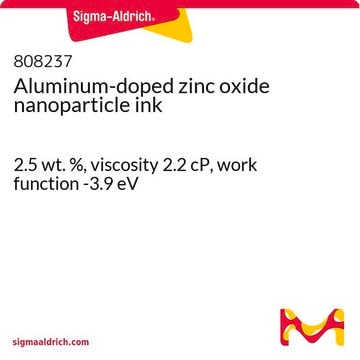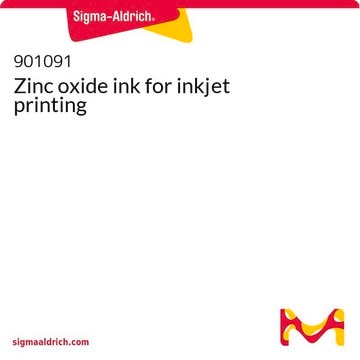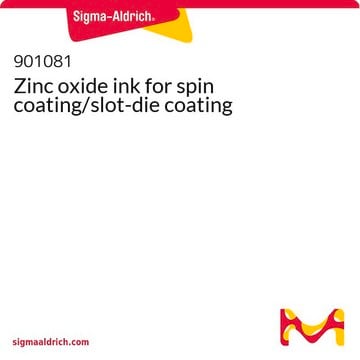793361
Zinc oxide nanoparticle ink
Synonym(e):
Avantama N-10, Nanograde N-10, Zinc oxide suspension, ZnO dispersion, ZnO ink, ZnO nanoparticle ink
Anmeldenzur Ansicht organisationsspezifischer und vertraglich vereinbarter Preise
Alle Fotos(1)
About This Item
Lineare Formel:
ZnO
UNSPSC-Code:
12352103
NACRES:
NA.23
Empfohlene Produkte
Form
dispersion
Qualitätsniveau
Konzentration
2.5 wt. % (crystalline ZnO in 2-propanol)
Farbe
translucent yellowish
Partikelgröße
10-15 nm
Dichte
0.800 g/mL at 25 °C
Allgemeine Beschreibung
Zinc oxide nanoparticle ink are nanoparticle-based printing inks allowing processing temperatures of 80°C. Zinc oxide nanoparticle ink is an electron selective interface layer ink containing zinc oxide (ZnO) nanoparticles in isopropanol. ZnO nanoparticle ink functions well as electron extraction layer (EEL) materials in solar cells.
Anwendung
This ZnO nanoparticle ink is for slot-dye, spin-coating, and doctor blading for the use as electron transport layer in printed electronics. This ZnO nanoparticle ink is universally applicable in normal and inverted architecture.
Annealing temperature <100°C.
Annealing temperature <100°C.
Sonstige Hinweise
Prior to application: Ultrasonicate and (optionally) filter through 0.45 μm PTFE filter
Post-treatment: Annealing of deposited ZnO films at 80°C - 120°C
Post-treatment: Annealing of deposited ZnO films at 80°C - 120°C
Rechtliche Hinweise
Product of Avantama Ltd.
Signalwort
Danger
H-Sätze
Gefahreneinstufungen
Aquatic Chronic 2 - Eye Irrit. 2 - Flam. Liq. 2 - STOT SE 3
Zielorgane
Central nervous system
Lagerklassenschlüssel
3 - Flammable liquids
WGK
WGK 1
Flammpunkt (°F)
53.6 °F
Flammpunkt (°C)
12 °C
Hier finden Sie alle aktuellen Versionen:
Besitzen Sie dieses Produkt bereits?
In der Dokumentenbibliothek finden Sie die Dokumentation zu den Produkten, die Sie kürzlich erworben haben.
A universal method to form the equivalent ohmic contact for efficient solution-processed organic tandem solar cells
Journal of Material Chemistry A, 2, 14896?14902-14896?14902 (2014)
Chun-Chao Chen et al.
Advanced materials (Deerfield Beach, Fla.), 26(32), 5670-5677 (2014-07-22)
Tandem solar cells have the potential to improve photon conversion efficiencies (PCEs) beyond the limits of single-junction devices. In this study, a triple-junction tandem design is demonstrated by employing three distinct organic donor materials having bandgap energies ranging from 1.4
Flexible organic tandem solar modules with 6% efficiency: combining roll-to-roll compatible processing with high geometric fill factors
Energy & Environmental Science, 7, 3284?3290-3284?3290 (2014)
Interface Design to Improve the Performance and Stability of Solution-Processed Small-Molecule Conventional Solar Cells
Advanced Energy Materials (2014)
Unser Team von Wissenschaftlern verfügt über Erfahrung in allen Forschungsbereichen einschließlich Life Science, Materialwissenschaften, chemischer Synthese, Chromatographie, Analytik und vielen mehr..
Setzen Sie sich mit dem technischen Dienst in Verbindung.







